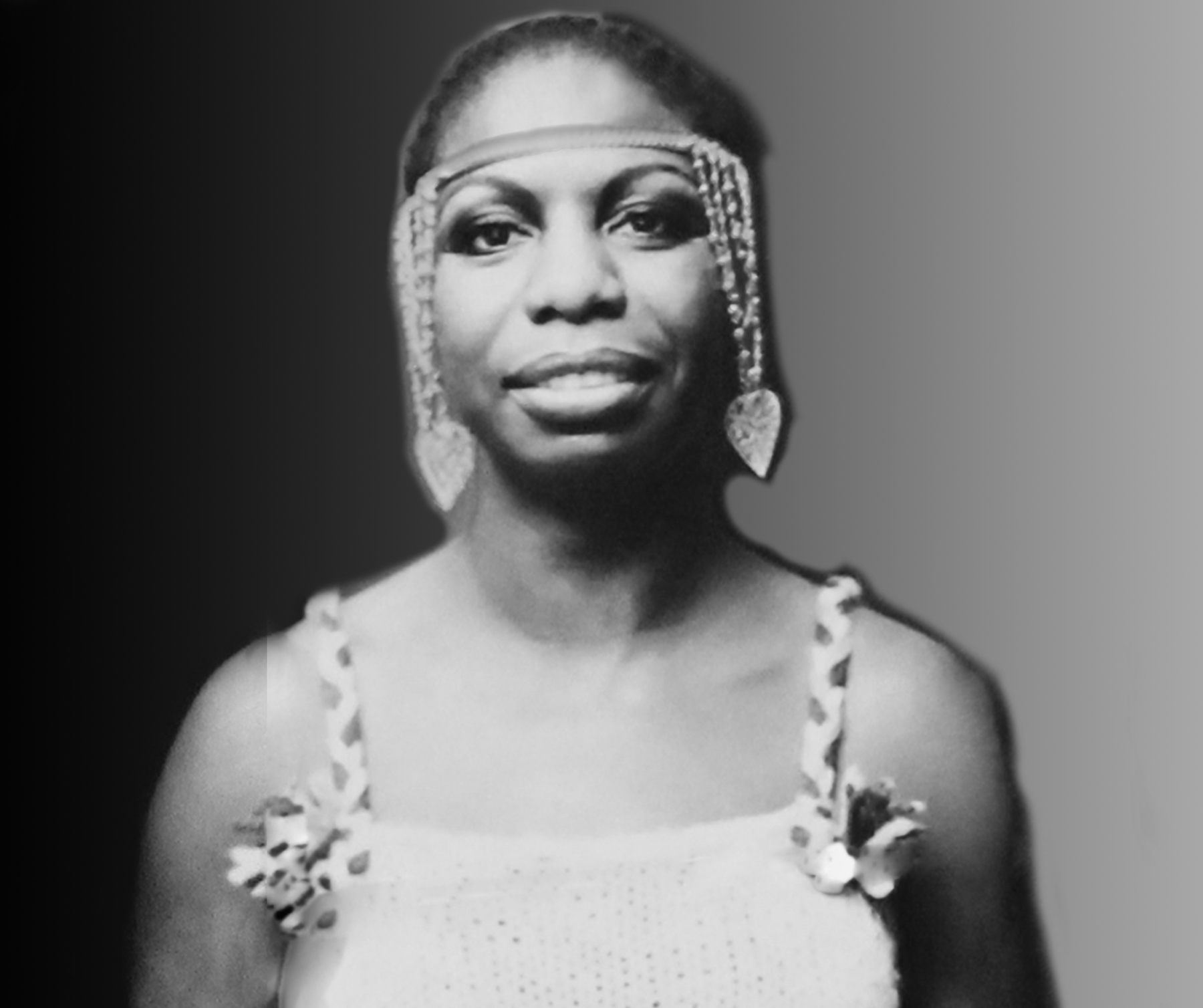American singer, songwriter, pianist, arranger, and activist in the Civil Rights Movement.
Nina Simone was named by Rolling Stone magazine as one of the 100 Greatest Singers of All Time and she will be inducted into the Rock and Roll Hall of Fame, class of 2018, this April. Yet, in her entire career, her one and only Top 20 pop hit was her version of “I Loves You Porgy” from the musical Porgy and Bess. It is nearly impossible to think about her life and career without being struck by contradictions. However, one thing is indisputable; she was one of the most extraordinary artists of the 20th century, an icon of American music and her triumphant voice sang what it meant to be young, gifted and black in a sometimes unjust and troubled world.
Simone’s early musical training emphasized classical piano and she expressed the desire to be recognized as the first major African-American concert pianist. Born Eunice Kathleen Waymon on February 21, 1933, in Tryon, North Carolina, Nina Simone took to music at an early age, learning to play piano at age of 3 and singing. After finishing high school, she came to New York City to study classical piano at the famed Juilliard School of Music. After a year, Simone had to leave school for financial reasons and moved to Philadelphia to go to a more affordable music program. Her career took an unexpected turn, however, when she was rejected from the Curtis Institute of Music. Curtis’s rejection was a shocking blow not only to her ego, but to her sense of reality. Simone said, “You feel the shame, humiliation and anger at being just another victim of prejudice and at the same time there’s the nagging worry that maybe…you’re just no good.”
Turning away from classical music and in an effort to earn a living, she started playing American standards, jazz and blues on the piano in Atlantic City clubs in the 1950s. Concerned that her mother would learn that she was playing in bars she took the stage name Nina Simone—”Nina,” derived from the Spanish word “niña,” came from a nickname used by her then boyfriend while “Simone” was inspired by French actress Simone Signoret. Before long, a bar owner said he expected her to sing along with her music. Untrained as a vocalist, Simone succeeded as a consummate musical storyteller who could use her voice to “weave a spell so seductive and hypnotic that the listener lost track of time and space as they became absorbed in the moment.” Her success as a singer earning her the nickname, “High Priestess of Soul.” Simone didn’t care for that label or that of “jazz singer” and wrote in her autobiography, “If I had to be called something, it should have been a folk singer because there was more folk and blues than jazz in my playing.”
Simone released a bevy of albums from the late ’50s throughout the ’60s and early ’70s, including records like The Amazing Nina Simone(1959), Nina Simone Sings Ellington! (1962), Wild Is the Wind (1966) and Silk and Soul (1967). She also made cover songs of popular music, eventually putting her own spin on such songs as Bob Dylan’s “The Times They Are A-Changin'” and the Beatles’ “Here Comes the Sun.” And she showed her sensual side with tracks like “Take Care of Business” on 1965’s I Put a Spell on You and “I Want a Little Sugar in My Bowl” on 1967’s Nina Simone Sings the Blues.
Simone’s music provided a soundtrack for the civil rights movement and she used her “unapologetic rage and accusatory voice to name names and take no prisoners in the African-American struggle for equality in the early 60s.” Simone struck up close friendships with James Baldwin, Langston Hughes, LeRoi Jones, Miriam Makeba, and Lorraine Hansberry, who became her political mentor and was a neighbor of Malcolm X’s widow, Betty Shabazz. She wrote “Mississippi Goddam” in response to the 1963 assassination of Medgar Evers and the Birmingham church bombing that killed four young African-American girls. Simone also penned “Four Women,” chronicling the complex histories of a quartet of African-American female figures, and “Young, Gifted and Black,” borrowing the title of a play by Hansberry, which became a popular anthem. After the assassination of Reverend Martin Luther King Jr. in 1968, Simone’s bassist Greg Taylor penned “Why (The King of Love Is Dead),” which was first performed by the singer and her band at the Westbury Music Festival.
Suffering lay at the heart of Simone’s work from the very start. In the 1970s and early 80s, Nina Simone was beset with major mental health and financial issues She suffered from bipolar disorder, a condition that remained undiagnosed until the 1980s She had two failed marriages, having a daughter Lisa with her second husband. Simone clashed with managers, record labels and the Internal Revenue Service to whom she owed hundreds of thousands of dollars in unpaid taxes. She led a nomadic life during this time, living in several different countries, including Liberia, Switzerland, England and Barbados before eventually settling down in the South of France.
Simone went through a career renaissance in the 1980s when her song “My Baby Just Cares For Me” was used in a Chanel No. 5 perfume commercial in the United Kingdom. The song thus became a Top 10 hit in Britain in 1985. She also penned her autobiography, I Put a Spell on You, which was published in 1991. Touring periodically, Simone maintained a strong fan base that filled concert halls whenever she performed.
Simone died in her sleep of natural causes on April 21, 2003, at her home in southern France; she was 70. While she may be gone, Simone left a lasting impression on the world of music, art and activism. She sang to share her truth, and her work still resonates with great emotion and power. Simone has inspired an array of performers, including Aretha Franklin, Laura Nyro, Joni Mitchell, and Lauryn Hill. Her deep, distinctive voice continues to be a popular choice for television and film soundtracks.
Two documentaries on the musician’s life were released in 2015: The Amazing Nina Simone, by Re-Emerging Films, and What Happened, Miss Simone?, from Netflix which received an Oscar nomination for best documentary.
Lyrics: Four Women
My skin is black
My arms are long
My hair is woolly
My back is strong
Strong enough to take the pain
inflicted again and again
What do they call me
My name is AUNT SARAH
My name is Aunt SarahMy skin is yellow
My hair is long
Between two worlds
I do belong
My father was rich and white
He forced my mother late one night
What do they call me
My name is SAFFRONIA
My name is SaffroniaMy skin is tan
My hair is fine
My hips invite you
my mouth like wine
Whose little girl am I?
Anyone who has money to buy
What do they call me
My name is SWEET THING
My name is Sweet ThingMy skin is brown
my manner is tough
I’ll kill the first mother I see
my life has been too rough
I’m awfully bitter these days
because my parents were slaves
What do they call me
My name is PEACHES– Nina Simone











